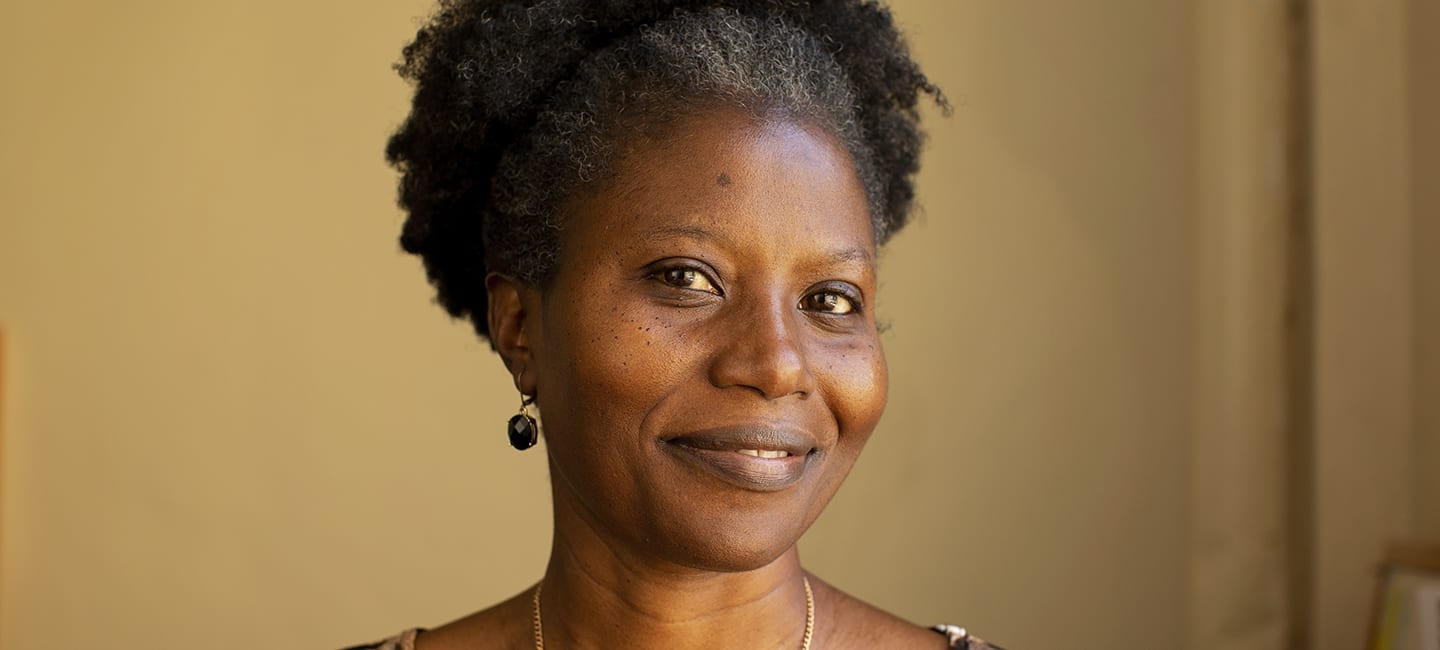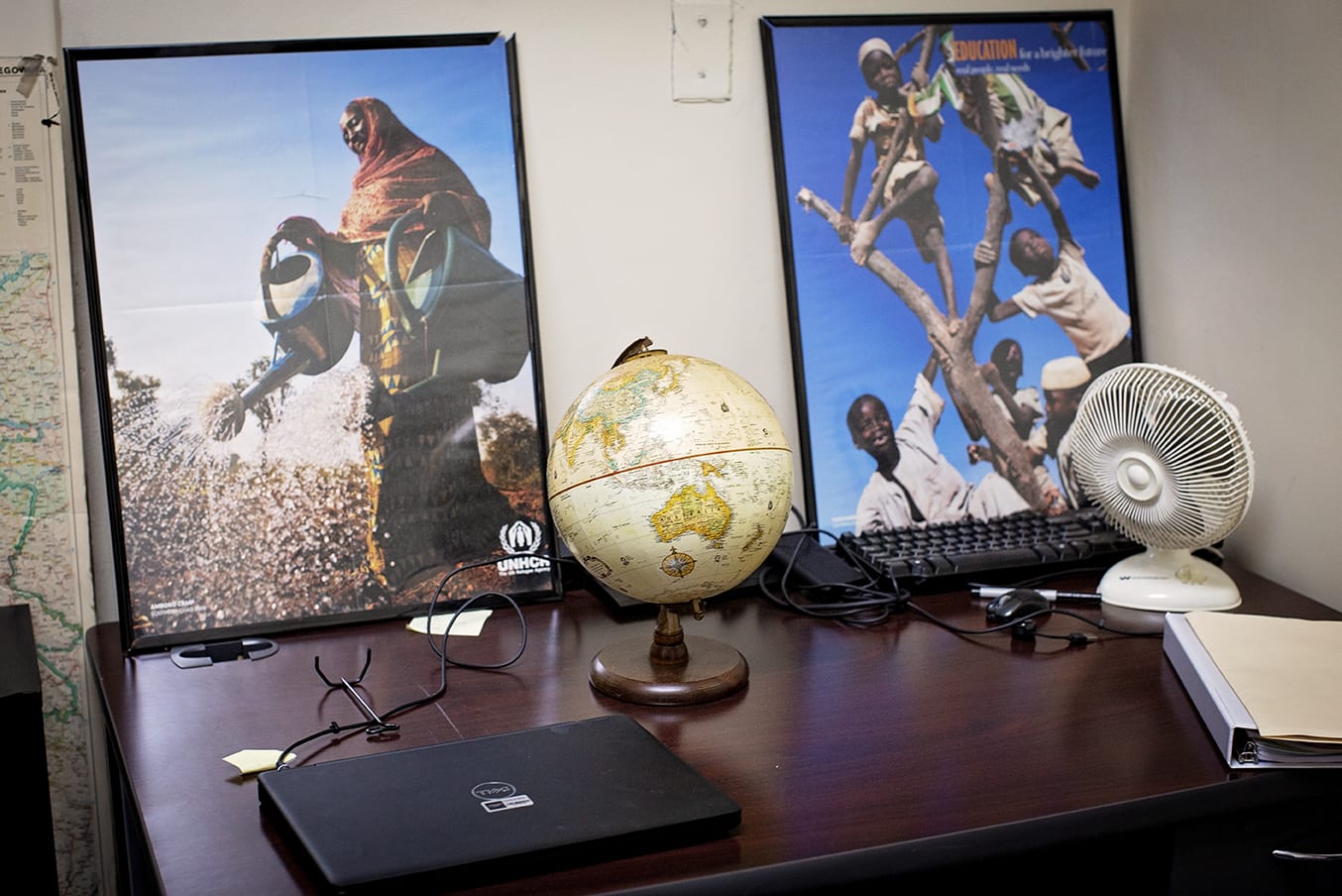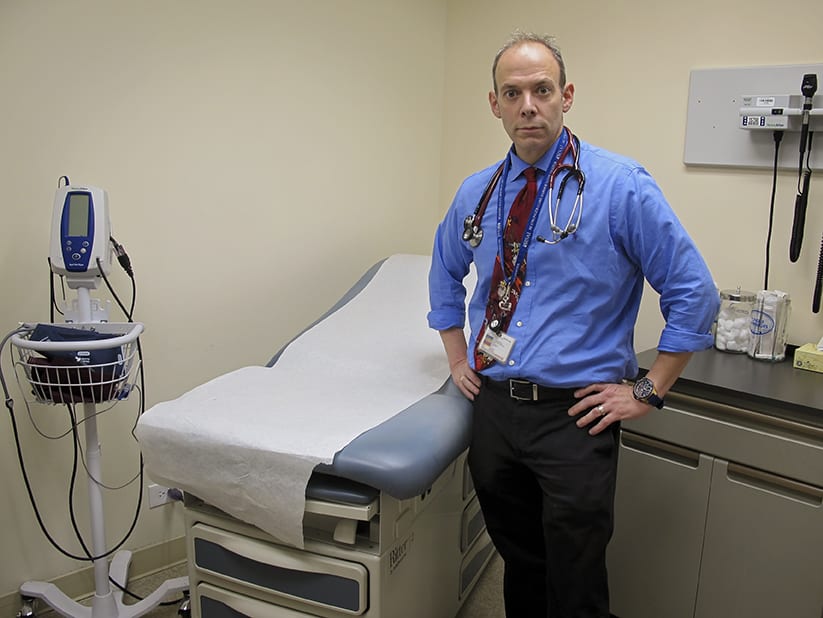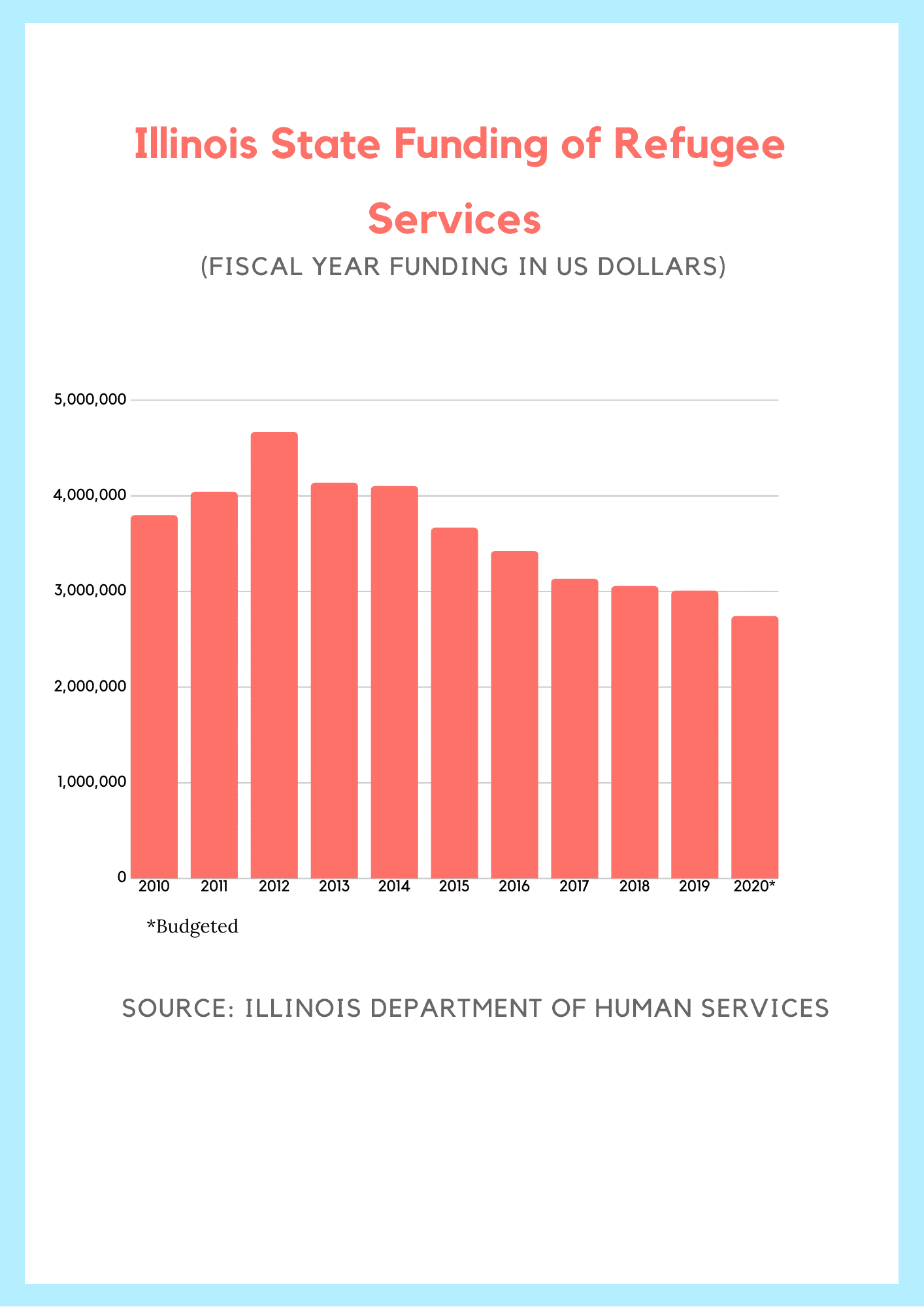 Photo by Michelle Kanaar
Photo by Michelle Kanaar After fleeing war, many refugees who come to Chicago face new traumas in a city that had nearly 3,000 shooting victims last year. But the health services that once existed to support them are now being gutted.
Above: Martine SongaSonga, a mental health clinical practitioner at Heartland Alliances’s International Family, Adult, and Child Enhancement Services, pictured at IFACES on Nov. 11, 2019. Photo by Michelle Kanaar.
When Martine SongaSonga walked into her office in Uptown one cool morning this May, her coworkers were frantic.
“They said, ‘Are you OK? Where did you come from? Which side of the building were you on?’” SongaSonga recalled. “I said, ‘Oh my God.’”
Just minutes before she arrived, a gunman opened fire near her office building, chasing another man down the busy street and shooting at him as people made their way to work.
As a therapist at a community-based mental health center that serves refugees across the Chicago area, SongaSonga was used to dealing with traumatic situations. Many of her clients at Heartland Alliances’s International Family, Adult and Child Enhancement Services (IFACES) had fled war or violence in their home country and suffered from post-traumatic stress disorder or depression.
But the shooting rattled SongaSonga, a former human rights activist from the Democratic Republic of Congo. For her and her clients, the incident as well as other acts of violence they had witnessed near their homes or workplaces in Chicago were new traumas, triggering some of their worst memories and adding to the stress of trying to start over in a new country they hoped would be safe.
Since 1999, IFACES has helped hundreds of refugees struggling with traumas like these as well as serious emotional disorders and mental illness by providing them with counseling, group therapy and care coordination. While government funding for refugee services expires after five years, many of IFACES clients have been going to the clinic for much longer, some since its opening, in order to get low or no cost mental health services from people well-versed in refugee issues and who speak their native language.
But all that is about to change. At the end of this year, IFACES will shut its doors. Unable to pay for the program because of cuts in federal funding for refugees under the Trump administration, Heartland Alliance is shuttering the mental health center next month. While Heartland Alliance expects some of IFACES staff and services to be absorbed into its other programs, SongaSonga says the loss for IFACES clients who continue to struggle with trauma in Chicago is monumental.
“It’s like losing parents,” says SongaSonga. “They feel abandoned.”
***

Martine SongaSonga’s office at IFACES pictured on Nov. 11, 2019. SongaSonga has been running the community support group at IFACES for more than ten years. “When a client comes to us they come with strength too. Yes, they are broken, but they have assets and strength that makes the working relationship, the healing relationship, work,” says SongaSonga, “it’s like a flower that is dying and then you pour water and it blooms.” Photo by Michelle Kanaar.
IFACES is just the latest victim in a growing number of programs unable to sustain themselves in the wake of government reductions in refugee admissions and funding.
Last month, the Pan-African Association closed its doors after serving African and Rohingya refugees in the Chicago area for over a decade. The mutual aid association, which was based in the Edgewater neighborhood, helped refugees with everything from job placement to civic education to interpreting medical visits in the months and years after they arrived in the United States.
“The resettlement agencies will help you but at some point they tell you to go somewhere else, because they have a certain amount of funding and they have a limited time to provide services to the clients,” explains Pan-African Association executive director A. Patrick Augustin. “A resettlement agency can serve a client for two years, but after two years where are the clients going? They don’t have any other place to go. So the majority of the Africans have been referred to Pan-African Association so they can continue to receive services.”
The bulk of Pan-African Association’s funding came from the state for the last 17 years, says Augustin, so the organization was unable to continue its programs when it did not receive its regular grant this year.
“The decision was made to close the organization although I know the community suffers a lot,” says Augustin. “We closed the office, but every day people come and knock on the doors. This is the reality.”
The closing of the Pan-African Association follows the closure of World Relief Chicago’s refugee resettlement program last November. Before the State Department changed its refugee policy, WRC had been resettling refugees in the Chicago area since 1980.
Major refugee resettlement and service organizations have also shuttered in both Milwaukee and Madison in the last two years. Nationally, over 100 refugee resettlement agencies have closed their resettlement programs or suspended their resettlement services under the Trump administration, according to the Refugee Council USA, a coalition of nonprofits that advocates for and with refugees.
“The foundation of the U.S. refugee resettlement program is built on community relationships that have been fostered over decades,” says Sarah Seniuk, advocacy and communications manager for Refugee Council USA. “These office closures mean not only a loss of support for refugees who have been resettled more recently, but we risk losing some of those community relationships — relationships which are key to uplifting resettled refugees and ensuring their success as they build new lives.”
The closures mark the end of a three-decade build up of resources for refugees in the United States, which led the world in refugee resettlement between 1980 — the year Congress enacted the Refugee Act — and 2018. During that period, the United States took in 3 million of the more than 4 million refugees resettled globally, according to a Pew Research Center analysis. Annually, the United States has resettled an average of 95,000 refugees per year here since 1980.
But under the Trump administration, refugee admissions have been cut sharply. After taking office in 2017, President Trump lowered the refugee cap to 45,000 for the 2018 fiscal year, then to 30,000 for the 2019 fiscal year. This fall, the White House announced another dramatic reduction to 18,000 for the 2020 fiscal year, which began in October.
In a statement released earlier this month, the administration explained its policy of refugee resettlement reductions as part of its “commitment to make decisions based on reality, not wishes, and to drive optimal outcomes based on concrete facts.”
“[T]he security and humanitarian crisis along our southern border has contributed to a burden on our immigration system that must be alleviated before we can again resettle large numbers of refugees,” the statement reads. “Therefore, prioritizing the cases of those already in our country is simply a matter of common sense.”
But cuts in refugee resettlement numbers are impacting refugees already living in the United States, in addition to those trying to come here.
Organizations that support refugees in the United States are funded through a mix of federal, state and private funds. Heartland Alliance, for example, receives money from the State Department’s Bureau of Population, Migration and Refugees as well as through the Office of Refugee Resettlement (ORR), which sends money both through Springfield and directly to service agencies. ORR state funding — which covers everything from employment support to case management to mental health services — is determined based on the previous year’s arrivals.
Refugee admissions to Illinois have dipped from 3,045 refugees coming here in the 2017 state fiscal year to just 885 refugees coming here in the 2019 state fiscal year — a 70 percent drop. Funding for refugees at the state level has also seen a dramatic decrease. While Illinois spent $4.6 million on refugee services in the 2012 state fiscal year, the state is budgeted to spend only $2.7 million on refugee services for the 2020 state fiscal year, which began this July.
“At the refugee programs, every six months or so it seems like we get some other kind of cut,” says Amy Dix, the clinical manager of IFACES. “It’s really hitting us hard.”
At the same time, IFACES continued to see refugees who have been here for years and need ongoing support for mental health issues, which often don’t show up until the shock of being here has worn off.
“A very small number of people receive some mental health services before they arrive or something was identified like a PTSD diagnosis,” says Dix. “Once they feel that sense of OK, I’m a little bit more stable, I kind of know what I’m doing here, then sometimes those memories will come back and that’s when you see a PTSD reaction.”
Stressors like gun violence, the high cost of living and trying to learn English can exacerbate these issues, making the need for continuing health care all the more pressing.
***
On a recent afternoon, Dr. Gary Kaufman took a break from his packed day of appointments to give a tour of Sinai Health System’s Antillas Family Medical Center in Logan Square, where he serves as medical director. Past the crowded waiting area, where families fill the chairs and some sit on the floor, Kaufman shows the narrow clinic’s main thoroughfare: a hallway of doors each labeled with a medical specialty. Five days a week, doctors specializing in everything from internal medicine and psychiatry to gynecology and dentistry come to see patients.
“Welcome to the largest refugee screening clinic in the state of Illinois,” Kaufman says.
Despite its business today, the clinic is also a shadow of what it once was.
Founded in 1973 in the Rogers Park neighborhood as the Touhy Health Center, the clinic initially served the influx of Russian refugees who were settling in the area at the time. The state of Illinois contracted with Mount Sinai in those early days to conduct the mandatory medical screening exam that all refugees were required to have shortly after arriving in the United States.
While many of those early Russian patients continued to go to the clinic for the health needs well beyond that screening, when Kaufman joined Touhy as a physician fresh out of residency in September 2000, the clinic’s population shifted and grew with global conflicts. He treated Bosnians and Albanians, then Somalis and Afghans, and Congolese and Rohingyas.
The clinic also built up a network of refugee organizations and volunteers who could help inform Kaufman and his colleagues of the health challenges that incoming refugees were dealing with and ensure that once stateside, those refugees would receive the continuing medical care they needed by reminding them of their appointments and translating as needed.
By 2016, the Touhy Health Center was seeing over 2,000 refugees a year for their mandatory screening exam alone.
Then, the election happened.
“We were getting 120 or 130 refugees every single month easy,” says Kaufaman. “Now we get 30.”

Dr. Gary Kaufman, medical director of Sinai Health System’s Antillas Family Medical Center in Logan Square, pictured in an exam room on Nov. 8, 2019. Photo by Nissa Rhee.
Seemingly overnight, the number of refugees admitted to the United States dropped and the state of Illinois decided to cut the administrative grant it had been giving Sinai to pay for the support staff that kept the clinic running and the labor intensive maintenance of refugee health records that the government required.
Unable to find the $800,000 needed to keep the clinic running, Sinai announced that they were closing Touhy in October of last year. This January, Sinai moved Touhy’s core refugee services to their existing Antillas clinic. Kaufman was able to keep his most critical team members for the program, but the group downsized from a staff of 18 to seven. His old team spoke 25 languages in house; now they speak 10.
While Kaufman was also able to get a van to pick up refugee patients who live on the far North Side and take them down to Logan Square, he says that some of his patients have not been able to make the shift.
“I have a family of 15 kids, a refugee family where the mama wouldn’t do anything without me approving it. Like go to the hospital. Not unless Dr. Kaufman said. But she said, ‘I can’t make it, it’s just too far. I can’t get there and back and be home for the kids for school,’” says Kaufman. “These were people who really trusted us and loved us. That happened quite a bit. People wanted to stay with us and they knew that we gave good care and were somebody who understood what it means to be a refugee, but they couldn’t because of the distance.”
Kaufman fears what the long-term consequences of the shrinking refugee services network will be for refugees in the years to come, especially for those suffering from mental health issues. While his clinic has a psychiatrist who sees patients a few days a month, her appointments are booked out months in advance. Kaufman used to rely on IFACES to fill some of those gaps, but soon will have to look for alternatives. The institutional knowledge and support that was built up for refugees by Sinai, IFACES and others over decades is now at risk.
“We have state contracts for 40 years to do this,” says Kaufman. “We’ve got a lot of expertise in knowing how to care for refugees because we’ve been doing this for so long. Currently there’s nobody else in Chicago that does this.”
***
In her small office on the fourth floor of the Institute of Cultural Affairs building in Uptown in October, Martine SongaSonga flipped through a spiral notebook where she wrote down notes from her clients’ recent sessions.
Last fiscal year, IFACES served 238 people. When the program closes next month and is replaced by a care coordination program at Heartland Alliance, Dix estimates that they will be able to serve about half as many clients. Instead of seeing therapists in a standalone refugee-centered clinic, clients will be connected to therapists through Heartland Alliance’s federally qualified health center.
For SongaSonga, the process of saying goodbye to her clients has been emotional.
“I’m trying to say it in their own words,” SongaSonga says, consulting her notebook.
“‘We have learned a lot from you and have taken what we learned and tried to provide encouragement to other new arrivals.’
‘You support me so that I’m able to support and be there for my daughter. We don’t know what we will become without this program.’
‘I am alive here because of you. You motivate me to be strong and alive.’”
SongaSonga’s last day at IFACES is next month. She hopes to continue working with refugees or asylum seekers at another Heartland Alliance program in Chicago next year. Despite the loss of the program, she says she is optimistic about the future.
“I believe life is dynamic, it is not static,” says SongaSonga. As much as change can be difficult, it is worth it because we evolve. It is hard. But it is a process that we have to go through. We cannot stay the same.”
Have you been impacted by the funding cuts for refugees? Reach out to us at info@borderlessmag.org.
Support for this story came from the Chicago Headline Club Foundation.
Borderless Magazine is your source for stories that transcend boundaries. You can support our work with a tax-free donation today.

